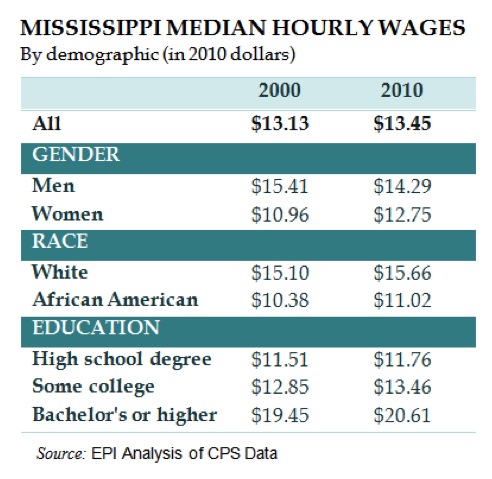State of Working Mississippi 2012 Chapter 2: WAGES
January 30th, 2012
Chapter 2 of MEPC’s latest State of Working report reveals that many members of the state’s workforce have not seen an improvement in their wages during the last ten years as employers and businesses were hit hard by two economic downturns, and state and local budgets tightened.
The table in this post looks at median wages –or the middle wage- for Mississippi workers at the beginning and end of the decade. All Mississippi wages have been adjusted for inflation and are in 2010 dollars.
WAGES BY EDUCATION, GENDER AND RACE
Overall, median wages for Mississippi workers changed by $0.32 over the decade from $13.13 in 2000 to $13.45 in 2010. Mississippi’s median wage falls below Southern norms. Wages for different education levels show that increases in educational attainment lead to wage gains particularly for adults that pursue post-secondary education and college.
In 2010, the median wage for men was $14.29 compared to $12.75 for women. The gap between men’s and women’s wages remains; however, it narrowed in Mississippi between 2000 and 2010. In 2000, the median wage for women equaled 71% of men’s wages and by 2010 median wages for women equaled 89% of their male counterparts. While women’s wages advanced over the decade, two economic downturns and job loss in traditionally male-dominated industries like manufacturing contributed to the reverse effect in men’s wages.
In contrast, wage disparities between white and African-American workers have persisted at a similar level for two decades. The median wage for white workers was $15.66 in 2010 while the median wage for African-American workers was $11.02. In 2000 and 2010, wages for African American workers measured approximately 70% white workers.
RECOMMENDATIONS
Over the last decade tuition at community colleges and universities has increased more rapidly than the small change in hourly wages for Mississippi workers. As a result, the cost of a college education now takes up a larger portion of a family’s income than it did in 2000. The rising cost of college education makes it harder for Mississippians to climb the economic ladder.
Keeping the post-secondary education affordable should remain a priority as the state makes critical decisions through the budgeting process. Mississippi needs a balanced approach that includes raising revenue instead of a cuts only approach that may threaten access to higher education.
The next State of Working Mississippi 2012 blog will feature findings on income and poverty from Chapter 3.
Author: Sarah Welker, Policy Analyst





